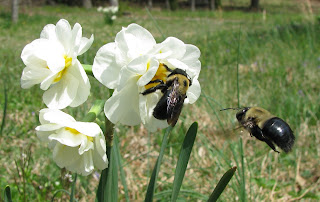Another
difference is that capitalism is usually a zero-sum game: somebody
wins only when somebody loses. This is a necessary result of
economic competition for finite resources. Since capitalism does not
recycle much at all, the resources it uses are limited. In contrast, nature often plays a
nonzero-sum game, if, for no other reason than that it recycles. One
species' waste, if it does well, provides even more resources for
other species. They both do well.
Cooperation
can also often be found buried deeply within nature's competitive
process. Two complementary species, who, at first glance are
seemingly in competition, can find themselves mutually beneficial to
one another in the long run. A lean-and-mean corporation, however, is
rarely concerned with anything beyond its immediate sphere of
influence.
The
various kinds of interactions between nature's many species also
leads to another significant difference between evolution and
capitalism: Evolution breeds diversity. A rich and healthy ecosystem
is populated by a wide variety of interconnected species. Mother
Nature tends to seek a sustainable balance in an ecosystem that finds
a large number of plants and animals working together in a complex,
symbiotic manner. As capitalism grows, however, the number of players
dwindles. Monopolies emerge and grow ever larger—think
Walmart or Microsoft. Since a monopoly can afford to be abusive (it
has few effective checks and balances), it tends to care little for
anything other than its quarterly economic bottom line.
It's
interesting that scientists have come to see evolution as a “blind”
process. That is, it has no intent, no design, and yet it has brought
about a beautiful, complex, and effective process that has done
extremely well for billions of years. In contrast, capitalism is very
intentional and has a narrow
and specific goal: maximization of profit. It works well in the short
term (creating that quarterly profit), but often is not sustainable
over the long run. Otherwise, would we pollute the planet as we do,
or be causing the climate change we are? Greed—an inevitable part
of capitalism—does not seem to play much of a role in evolution's
game.
So,
yes, capitalism and evolution do share some qualities...
competition being the obvious one. “Survival of the fittest”
plays a role in each system. It's useful to note, however, that
Darwin, in presenting his elegant theory, never used the term
“survival of the fittest.” He was really interested in the
“natural selection” process of evolution, and realized that it is
the cornerstone of nature's elegant and sustainable way. He also saw
that nature's competition eventually even brought about cooperation.
And
that factor of sustainability is crucial: evolution has worked
beautifully for a few billion years now. Capitalism is an upstart
that's been around for only a couple of hundred years. How much
longer will it last?


